Maple Syrup Hike at Ryerson LCFP

by Arthur
Posted on Sunday, March 15th, 2009 at 9:40 pm CET
Today we participated in one of the Maple Syrup Hikes at Ryerson Conservation Area. On the one-hour program we learned about the Sugar Maple trees that make sweet sap and how they tap them to make syrup. I love maple syrup on my pancakes and waffles and have always wanted to see this.
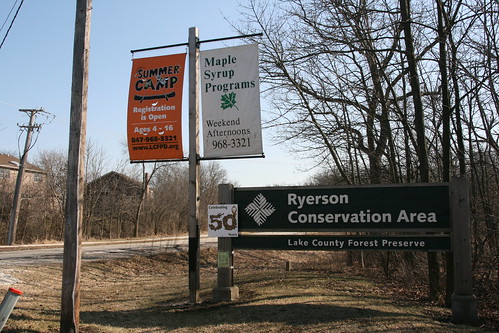
The program started out with a 15-minute lesson inside the Brushwood mansion where we learned about the way maple trees produce sap. The best tree for making maple syrup is the Sugar Maple and this species of maple is native to the northeastern part of North America. 80% of the world’s maple syrup is made in Canada, which produces about 7 million gallons per year. Sap is harvested in the spring months when sap flows from the roots up the tree. Freezing nights and warm days are needed in order to induce sap flows, and today was perfect for that. It was another beautiful sunny and warm day.
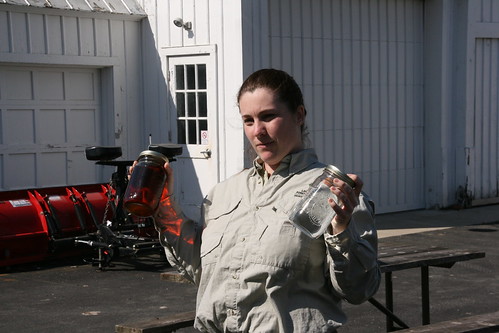
The sap that comes out of the trees is made up of 98% water and 2% sugar. This stuff is clear (the right jar in the above picture). That is not nearly sweet enough to be used as maple syrup, so they boil the sap to reach the correct density of sugar. At least 66% sugar is needed for it to be called syrup, and at this stage it is thick and brown (the left jar). It takes about 40 gallons of sap to make just one gallon of maple syrup.
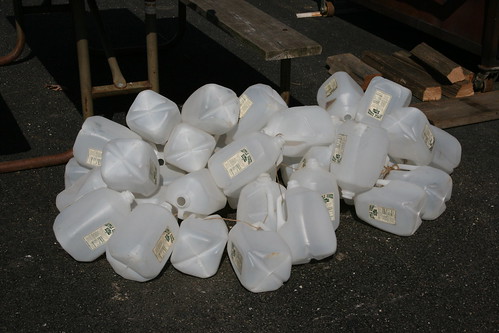
a pile of 40 one-gallon containersThey tap only 32 maple trees at Ryerson, which is enough to make the 5 gallons of maple syrup they need for these programs and for their volunteers. We walked to some of the trees and took off the covers to see the dripping tapholes. They were dripping constantly because of the good weather conditions of the day (freezing night, warm day).
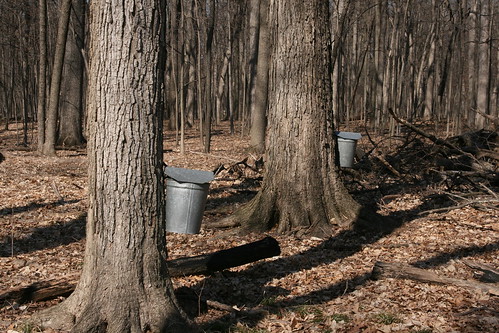

Here’s a short video (VERY short) to illustrate that the taps were dripping quite fast today:
Each bucket had a block of ice in it, and they usually take out these blocks of frozen water so that they have to boil less of it off. We all got to taste the sap right from the tree by holding our finger under the drip. It tasted mostly just like water with just a hint of sugar.
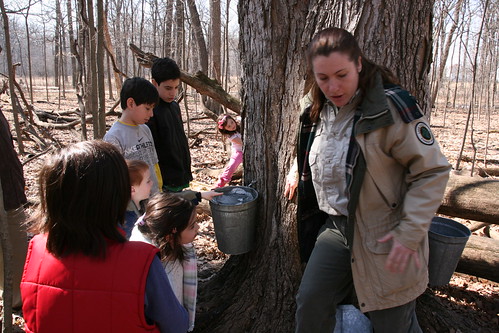
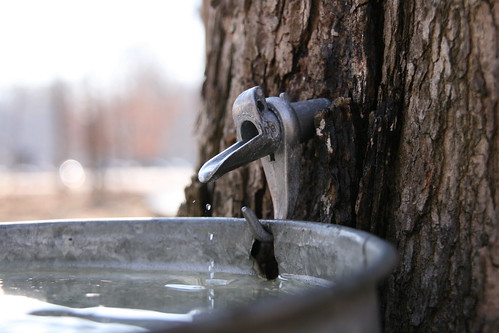
They only tap old trees; they say that the trunk of the tree needs to be so wide that you cannot reach your arms around it. Tapping the trees doesn’t hurt them, as people only take out a very small percentage of its sap. It’s like taking blood from a person; the body just makes more blood.
We got to drill a little tap hole in a log with one of the hand drills they use.
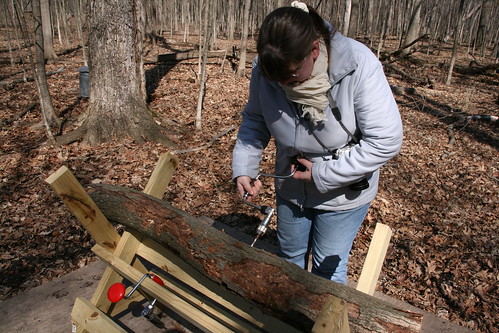
Here’s a cross-section of a log with a tap stuck inside. As you can see it doesn’t go very deep, but it’s deep enough to reach the area where the sap flows up the trunk in springtime. Inside there’s a small hole at the bottom of the tap to catch the sap.
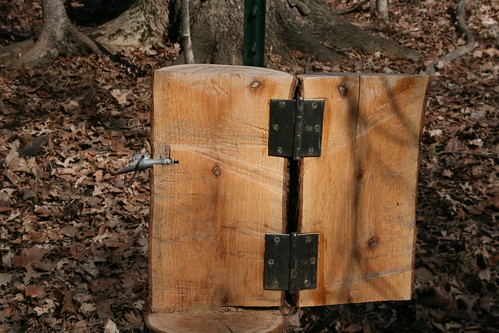
Our guide also showed the stove they use to boil off the water.
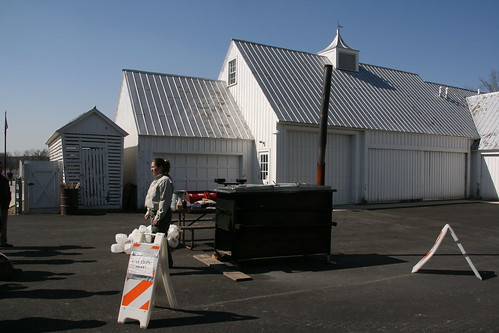
I had a great time and learned a lot about the maple syrup process. I already liked pure maple syrup a lot, and now I like it even more. I feel like pancakes! 🙂
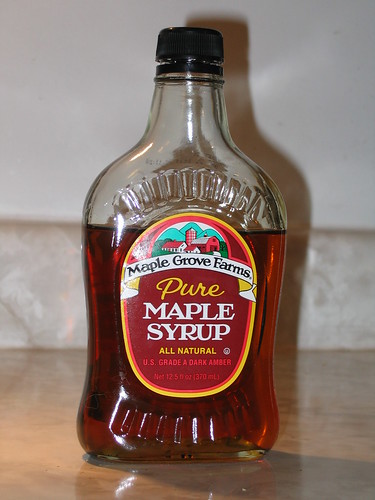
Today we participated in one of the Maple Syrup Hikes at Ryerson Conservation Area. On the one-hour program we learned about the Sugar Maple trees that make sweet sap and how they tap them to make syrup. I love maple syrup on my pancakes and waffles and have always wanted to see this.

The program started out with a 15-minute lesson inside the Brushwood mansion where we learned about the way maple trees produce sap. The best tree for making maple syrup is the Sugar Maple and this species of maple is native to the northeastern part of North America. 80% of the world’s maple syrup is made in Canada, which produces about 7 million gallons per year. Sap is harvested in the spring months when sap flows from the roots up the tree. Freezing nights and warm days are needed in order to induce sap flows, and today was perfect for that. It was another beautiful sunny and warm day.

The sap that comes out of the trees is made up of 98% water and 2% sugar. This stuff is clear (the right jar in the above picture). That is not nearly sweet enough to be used as maple syrup, so they boil the sap to reach the correct density of sugar. At least 66% sugar is needed for it to be called syrup, and at this stage it is thick and brown (the left jar). It takes about 40 gallons of sap to make just one gallon of maple syrup.

a pile of 40 one-gallon containers
They tap only 32 maple trees at Ryerson, which is enough to make the 5 gallons of maple syrup they need for these programs and for their volunteers. We walked to some of the trees and took off the covers to see the dripping tapholes. They were dripping constantly because of the good weather conditions of the day (freezing night, warm day).


Here’s a short video (VERY short) to illustrate that the taps were dripping quite fast today:
Each bucket had a block of ice in it, and they usually take out these blocks of frozen water so that they have to boil less of it off. We all got to taste the sap right from the tree by holding our finger under the drip. It tasted mostly just like water with just a hint of sugar.


They only tap old trees; they say that the trunk of the tree needs to be so wide that you cannot reach your arms around it. Tapping the trees doesn’t hurt them, as people only take out a very small percentage of its sap. It’s like taking blood from a person; the body just makes more blood.
We got to drill a little tap hole in a log with one of the hand drills they use.

Here’s a cross-section of a log with a tap stuck inside. As you can see it doesn’t go very deep, but it’s deep enough to reach the area where the sap flows up the trunk in springtime. Inside there’s a small hole at the bottom of the tap to catch the sap.

Our guide also showed the stove they use to boil off the water.

I had a great time and learned a lot about the maple syrup process. I already liked pure maple syrup a lot, and now I like it even more. I feel like pancakes! 🙂


